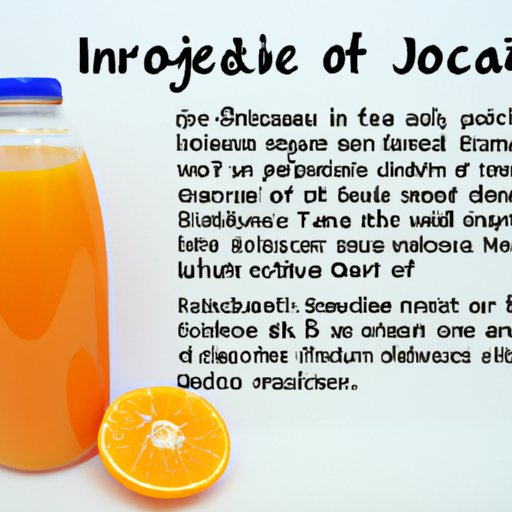Introduction: Exploring the Benefits and Risks of Drinking Orange Juice
Orange juice, a popular drink enjoyed around the world, has been touted as a healthful beverage for decades. It’s often seen as a nutritious way to start the day, and many people rely on it for a dose of vitamin C and other vitamins and minerals. But is orange juice really good for you? In this article, we’ll explore the potential benefits and risks associated with drinking orange juice, and provide tips for adding it to a healthy diet.

The Healthiest Types of Orange Juice
When it comes to orange juice, there are two main types available: freshly squeezed and store-bought. Freshly squeezed orange juice is made from oranges that have been squeezed by hand or in a juicer. This type of orange juice is generally considered the healthiest because it contains more vitamins, minerals, and other nutrients than store-bought juice. It also has a shorter shelf life and must be consumed within a few days of being made.
Store-bought orange juice is made from oranges that have been processed and pasteurized. This type of orange juice is widely available and has a longer shelf life than freshly squeezed juice. However, it may contain added sugar and other additives that can reduce its nutritional value.
Comparing the Nutritional Content of Freshly Squeezed vs. Store-Bought Orange Juice
Both freshly squeezed and store-bought orange juice contain vitamins, minerals, and other nutrients that can contribute to overall health. Vitamins A and C are found in both types of orange juice, while store-bought orange juice also contains folic acid. Both types of orange juice also contain potassium, magnesium, and calcium.
When it comes to calorie and sugar content, freshly squeezed orange juice typically contains fewer calories and less sugar than store-bought orange juice. A 8-ounce glass of freshly squeezed orange juice has about 110 calories and 22 grams of sugar, while a 8-ounce glass of store-bought orange juice has about 140 calories and 26 grams of sugar.
Can Too Much Orange Juice Be Unhealthy?
Although orange juice is a healthful beverage, overconsumption of it can be detrimental to your health. According to a study published in the American Journal of Clinical Nutrition, excessive consumption of orange juice can increase the risk of obesity, type 2 diabetes, and other metabolic diseases. The study also found that drinking more than three glasses of orange juice per day can lead to an increased risk of developing high blood pressure.
It’s important to note that the recommended daily intake of orange juice varies depending on age and gender. For adults, the recommended intake is one to two 8-ounce glasses per day. Children should limit their intake to one 8-ounce glass per day.

How to Incorporate Orange Juice Into a Healthy Diet
If you’re looking to incorporate orange juice into your diet, there are plenty of ways to do so. You can mix orange juice with sparkling water to make a refreshing and hydrating beverage, or blend it with frozen fruit to make a healthy smoothie. Orange juice can also be used in marinades, sauces, and dressings for added flavor and nutrition.
When choosing an orange juice, opt for freshly squeezed or store-bought varieties with no added sugar or preservatives. If you’re watching your calorie and sugar intake, look for brands that are labeled “low sugar” or “no sugar added”. If you’re looking for a nutrient boost, opt for orange juice fortified with additional vitamins and minerals.
Which Orange Juices Provide the Most Vitamin C?
One of the main reasons people drink orange juice is for its vitamin C content. Vitamin C is an essential nutrient that helps support the immune system, promote skin health, and protect against oxidative stress. When it comes to orange juices, some varieties contain more vitamin C than others. Here is a list of popular orange juices and their vitamin C contents per 8-ounce glass:
- Freshly squeezed orange juice: 90 milligrams
- Store-bought orange juice (no sugar added): 80 milligrams
- Tropicana Orange Juice (no sugar added): 60 milligrams
- Minute Maid Orange Juice (no sugar added): 50 milligrams
- Simply Orange Orange Juice (no sugar added): 45 milligrams
In addition to orange juice, other foods like citrus fruits, bell peppers, broccoli, and tomatoes are also excellent sources of vitamin C.

Conclusion: Summarizing the Benefits and Risks of Drinking Orange Juice
Overall, orange juice can be a healthful addition to your diet if it’s consumed in moderation. It’s a great source of vitamin C and other vitamins and minerals, and can help support a healthy immune system. However, it’s important to be mindful of the calorie and sugar content of your orange juice, and to limit your intake to one to two 8-ounce glasses per day. By following these guidelines, you can enjoy the benefits of orange juice without putting your health at risk.
(Note: Is this article not meeting your expectations? Do you have knowledge or insights to share? Unlock new opportunities and expand your reach by joining our authors team. Click Registration to join us and share your expertise with our readers.)
